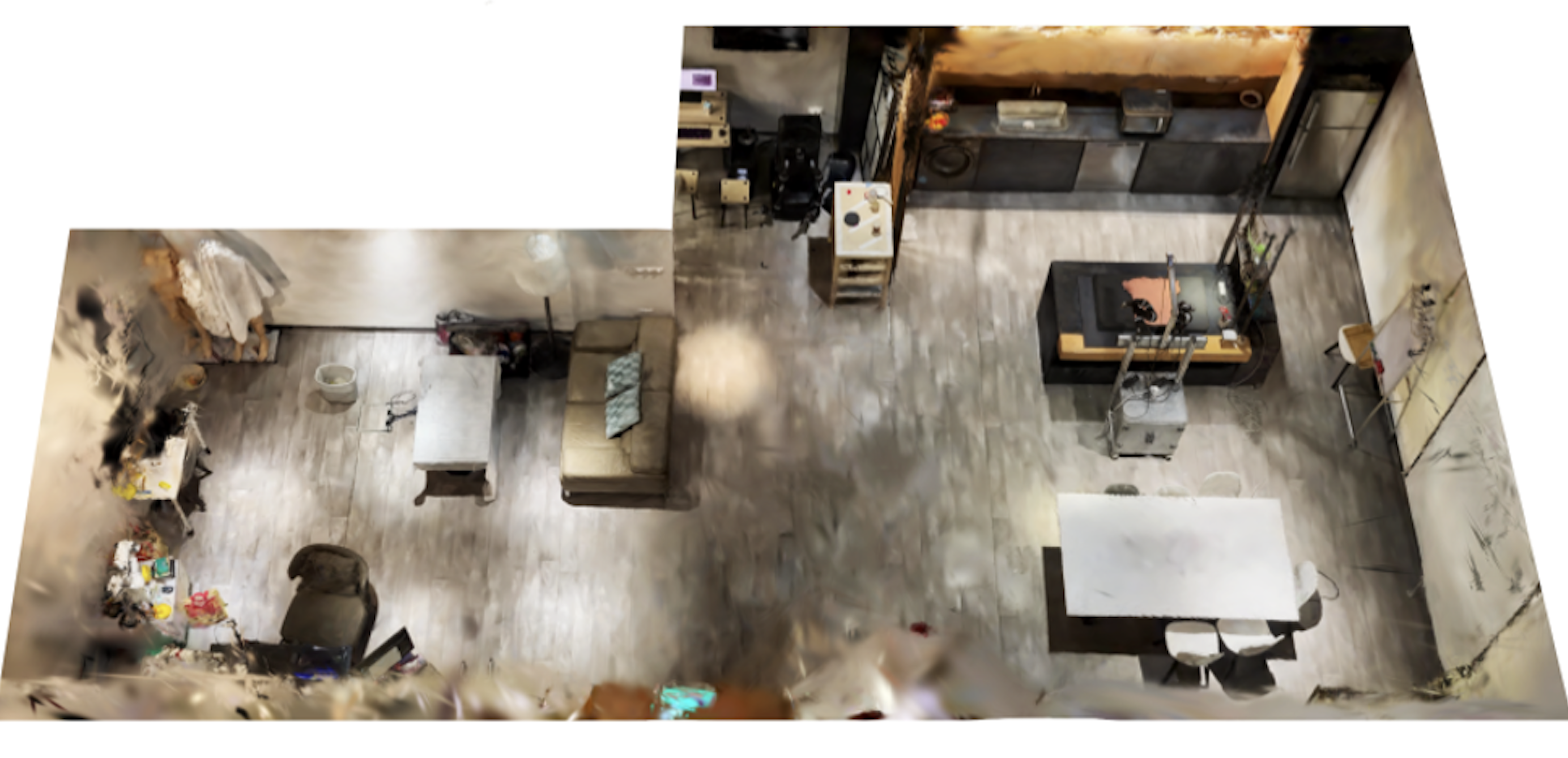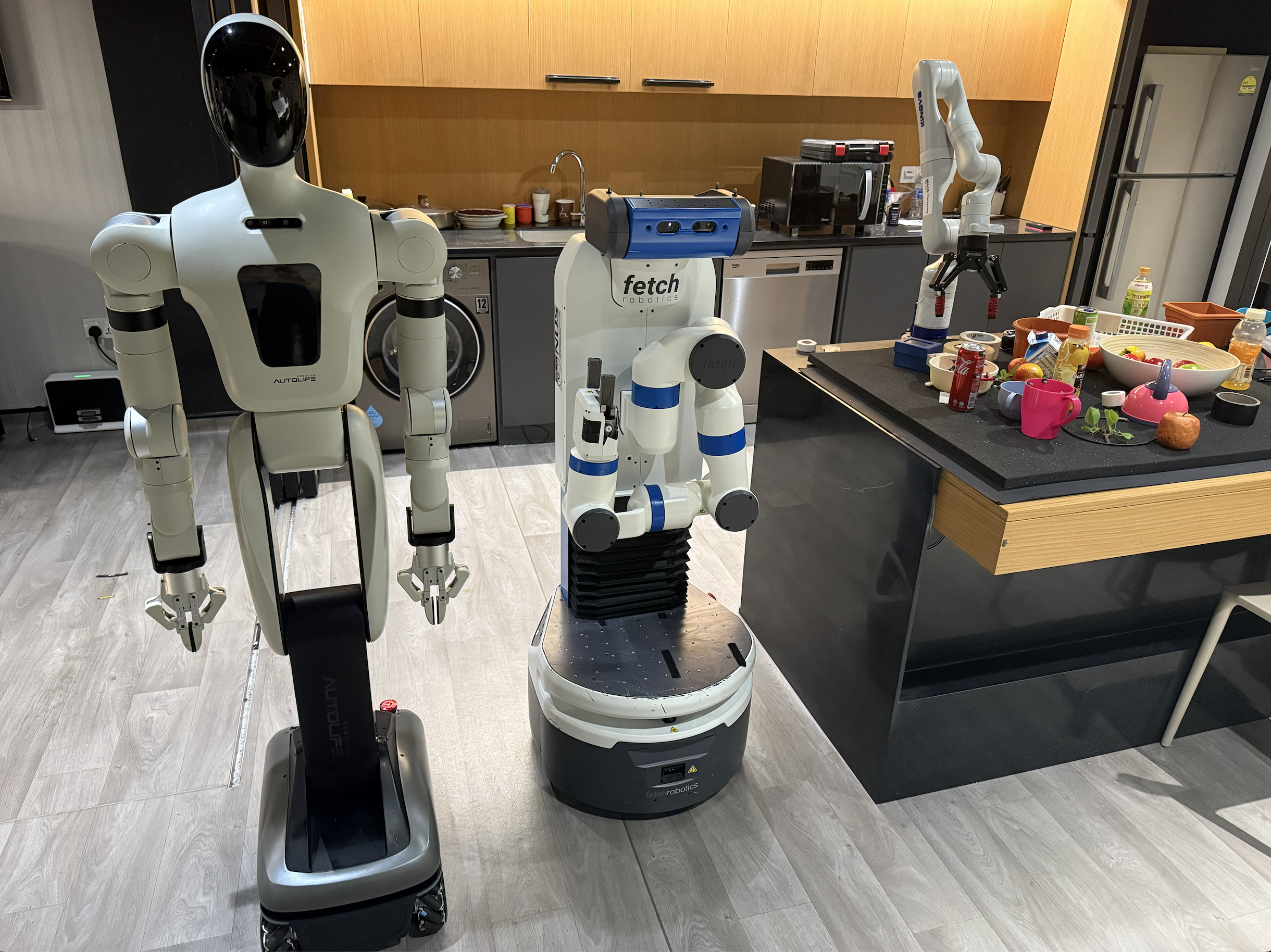Join Us
We are always looking for motivated undergraduate interns and master students with strong experience in robotics to join our mobile manipulation team at the Adaptive Computing Laboratory at the National University of Singapore.
In our mobile manipulation team, we are building a large-scale mobile manipulation system, where we can explore the following cutting-edge research topics:
- Open-world Planning with Uncertainty: Develop algorithms for robots to explore and interact with novel objects and unseen environments
- Task and Motion Planning for Mobile Manipulation: Develop systems for robots to reason across both high-level tasks and low-level motion jointly
- Seemless Multi-Modal Human-Robot Interaction: Study and explore the seamless integration of multi-modal human-robot interaction into service robots
- Skill Learning from Human Demonstrations: Develop systems for robots to learn mobile manipulation skills solely from human demonstrations
Lab Resources
Our lab is equipped with cutting-edge robotics hardware and computing infrastructure to support advanced research:

Robot Living Studio - Our Real-world testing environment

Autolife, Fetch, and Kinova Gen3 in the kitchen area
Robotic Platforms
Autolife Robot
- Omnidirectional base + 4 DOF torso + 2×7 DOF arms
- 1 RGB-D camera + 2 2D LiDARs + 3 fisheye cameras in the head + 2 fisheye cameras in the grippers
Fetch Robot
- Differential drive base + 1 DOF torso + 7 DOF arm + 2 DOF head
- 1 RGB-D camera + 1 2D LiDAR
- Existing Model-based and Learning-based skills
Computing Infrastructure
High-Performance Computing
- 16 NVIDIA H100/H200 GPUs
- 20+ 2080Ti GPUs
Robot Living Studio (Real-world testing environment)
- Divided into 3 areas: kitchen, living room, meeting room
- Diverse objects and locations for robots to interact with
- Motion capture system in all areas
- The infrastructure for Robot-Workstation-Server communication
Available Positions
Undergraduate Research Interns (NUS)
For NUS undergraduate students, you can directly contact Prof. Hsu for the UROP or FYP opportunities and mention my name and project.
Ideal candidates should have:
- Strong programming skills (Python, C++, ROS)
- Experience with real-world robotic systems
- Completed at least one Robotics course and one 3000 level AI course
- Duration: Flexible (Can support FYP projects)
Undergraduate Research Interns (Overseas)
For motivated undergraduate students at overseas universities, you can send me an email first to discuss the internship opportunities.
Ideal candidates should have:
- Strong programming skills (Python, C++, ROS)
- Experience with real-world robotic systems
- 3rd/4th year CS or Automation related major student with high GPA
- Duration: 6 months (remote + onsite), at least 2 months onsite (with stipend)
Master's Thesis Students (NUS)
We also offer thesis projects for MComp in AI students, you can contact Prof. Hsu for the thesis opportunities and highlight my project in the title.
Ideal candidates should have:
- Experience with real-world robotic systems or large scale deep learning
- Experience with robot manipulation and foundation models
- Strong programming skills and machine learning background
- Duration: two semesters
PhD Students at School of Computing
At School of Computing, you can only be admitted through committee and find a supervisor based on lab rotation. For the incoming semester's SoC Student, you can contact Prof. Hsu for lab rotation and highlight my project in the title.
All candidates should have:
- PhD offer from NUS School of Computing
- Strong research background and publications in Robotics/Automation
- Strong hands-on experience in real-world robotic systems
Frequently Asked Questions
Q: Do I need prior robotics experience for an internship?
A: We value real-world robotic research, so we prefer candidates who already familiar with how the robots work and how to program them. For the student who are not familiar with the robots but have strong research experience in AI/CV, we could also provide training and mentorship for them to learn robotics.
Q: What programming languages should I know?
A: Python and C++/C are essential. Experience with ROS/ROS2, PyTorch/TensorFlow, and simulation environments (Gazebo, MuJoCo, IsaacSim) is a plus.
Q: Are remote positions available?
A: Most research positions require on-site presence due to hardware requirements. For overseas students, we can support hybrid arrangements with at least 2 months onsite.
Q: Is there any funding support?
A: If you are NUS undergraduate/graduate student, we only provide credit-based research opportunities without funding. If you demonstrate strong research capabilities, we can offer part-time/full-time research assistant positions after the internship/graduation. For overseas students, we only offer stipend during the onsite period, which can cover the housing expenses and some daily expenses.